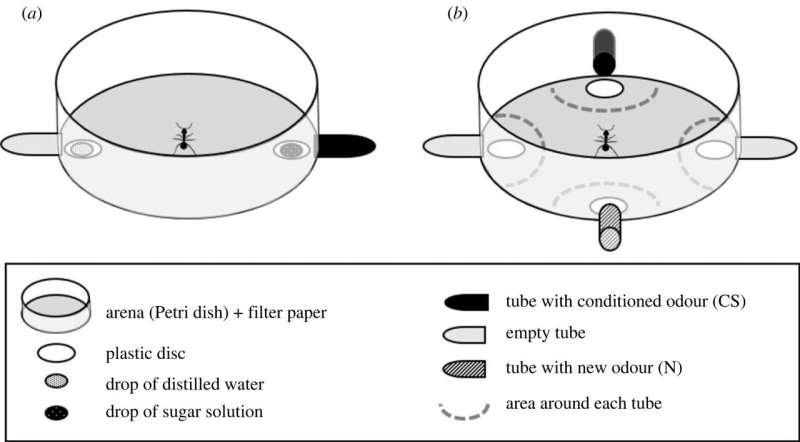January 26, 2023 report
This article has been reviewed according to Science X's editorial process and policies. Editors have highlighted the following attributes while ensuring the content's credibility:
fact-checked
peer-reviewed publication
trusted source
proofread
Training ants to sniff out cancerous tumors in mice

A team of researchers from Université Sorbonne Paris Nord, Université Paris-Saclay and Institut Universitaire de France has found that it is possible train ants to sniff out cancerous tumors in mice. In their study, published in Proceedings of the Royal Society B, the researchers trained groups of ants to respond to chemicals in urine samples that were associated with cancerous tumors.
Ants have an excellent sense of smell. And cancerous tumors in animals, including humans, produce chemical compounds that can make their way into urine samples. Some research has demonstrated that certain animals can detect those chemical compounds via smell—dogs are a prime example, but others, such as roundworms, are able to do so as well. In this new effort, the researchers wondered if the same might be true for ants and whether they might be used as an early cancer detection method. To find out, they conducted some simple tests.
The tests involved first teaching groups of ants to recognize the presence of tumor chemicals by giving them sugary rewards. The researchers found that not only could the ants discern the difference between urine samples from cancerous mice versus those that were cancer-free, they could also be taught to do so in just 10 minutes.
Once the ants were trained to associate a sugary reward with urine containing chemicals from a mouse with a cancerous tumor, they began the second phase of testing.
The second phase involved transplanting breast cancer tumor tissue from human patients into several mice. They then waited for the tumors to establish themselves. Next, they collected urine samples from both healthy mice and those that had been given tumors and presented them to groups of ants. The researchers found that the ants spent approximately 20% more time sniffing samples that came from mice with tumors.
The researchers suggest that the ants were able to distinguish between urine from mice with cancer versus those that were healthy. The next phase of their research will involve finding out if the ants can do the same with human urine.
More information: Baptiste Piqueret et al, Ants act as olfactory bio-detectors of tumours in patient-derived xenograft mice, Proceedings of the Royal Society B: Biological Sciences (2023). DOI: 10.1098/rspb.2022.1962
Journal information: Proceedings of the Royal Society B
© 2023 Science X Network




















